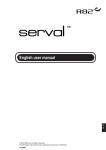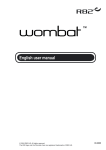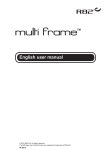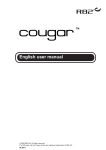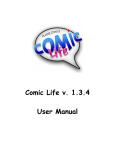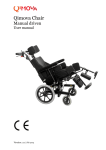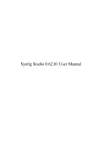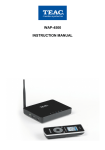Download English user manual
Transcript
cheetah TM English user manual G B © 2010 R82 A/S. All rights reserved. The R82 logo and the Cheetah chairs are registered trademarks of R82 A/S. 05.2011 rev. 003 GB G B CONTENTS Safety................................................................................. 4 Tools................................................................................... 4 Maintenance....................................................................... 4 Warranty............................................................................. 5 Mounting and dismounting from the chair.......................... 5 Quick release..................................................................... 6 Foot support....................................................................... 7 Drum brake......................................................................... 8 Hand brake......................................................................... 9 Seat and back angling...................................................... 10 Back and seat width......................................................... 11 Seat depth and back height.............................................. 12 Back extension................................................................. 13 Seat extension and webbing............................................ 14 Anti-tip device................................................................... 15 Head support and helper's handle.................................... 16 Swing away side supports................................................ 17 Transfer arm rests and side plates................................... 18 Pommel............................................................................ 19 Side plates........................................................................ 20 Mudguards....................................................................... 20 Arm rests.......................................................................... 21 Tray.................................................................................. 22 Conversion kit................................................................... 23 Wheel combinations Cheetah 3-wheeler.......................... 24 Wheel combinations Cheetah 4-wheeler.......................... 25 Seat belt attachment........................................................ 26 Fix locks............................................................................ 26 Hip belt............................................................................. 28 Y-hip strap........................................................................ 28 Ankle straps...................................................................... 29 Foot straps....................................................................... 29 Transportation belt............................................................ 29 Transportation.................................................................. 30 Transportation in motor vehicles 1/2................................ 31 Transportation in motor vehicles 2/2................................ 32 Product identification........................................................ 33 Measurements.................................................................. 34 Technical data.................................................................. 35 Producer........................................................................... 35 Distributor......................................................................... 35 Care and maintenance..................................................... 36 Stain removal guide.......................................................... 37 Troubleshooting................................................................ 38 2 U.S. Patent No. US7,404,567 B2 GB U.S. Patent No. US7,404,567 B2 CHEETAH In choosing the Cheetah, we are sure that you have got an active wheelchair, which will live up to any expectations one can have for a modern aid for children. Cheetah is an active wheelchair, developed for the active child who both wants to and can move around on its own. With this wheelchair, the child has every possibility of moving around and being together with other children, still with exeptional seating comfort as the main focus. The Cheetah is delivered either as a 3-wheel or 4-wheel model. This user manual is meant as guide to assist the user in gaining the full benefit of the many options offered by the Cheetah. Therefore we recommend you to go through this manual before the Cheetah is put into use. 3 G B GB SAFETY The Cheetah has earned the CE-mark. This certifies that it meets all relevant European safety requirements. Further the Cheetah is approved according to EN 12182 and EN 12183. This manual is approved according to ISO 7176-15 and EN 1041. The durability of this product is 5 years when it is used on a daily basis. Hereafter the product must be renovated (by R82 personnel) to extend the lifetime. Remove the CE-mark, when rebuilding the product or when using other than original R82 spare parts and fittings. Never leave your child unattended in this product. Ensure constant supervision by an adult. Incorrect use of the product, may cause serious injury to the user. Ensure that the belt is securely fixed to the product before every use. The chair is constructed for one user only. Do not place more than one user in the chair. The latest version of the manual is always available online: www.R82.com GB TOOLS There is a tool bag at the back of the chair with 3, 4, 5 and 6 mm Allen keys. Use these tools for the adjustments described in the manual. You will also find a set of reflector stickers which may be adhered to the chair. We recommend that you place the reflector stickers on the front by the front wheels, on the back under the seat and on the sides of the chair. G B GB MAINTENANCE - Check the tyres regularly for air. Air presure: 110 PSI/7,5 bar/750 kPa - 36 PSI/3,5 bar/350 kPa. - Check the function of the hand brake regularly. Safety distance between the wheel and the brake block is: 8-10 mm - Clean the frame on a regular basis, especially when it has been in contact with rainwater / saline water. Adjustments which are not described in this manual, must only be made by authorized R82 personnel. Oil the swing away parts, the turn handle and the spring boxes occasionally. We recommend to use a synthetic teflon oil. Do not use any cleaning materials containing chlorine or methylated spirit. Please find the stain removal guide in the back of the manual. 4 GB WARRANTY R82 offers a 2-year warranty against defects in workmanship and materials and a 5-year warranty on breakage of the metal frame caused by defects in welds. The warranty would be adversely affected if the customer’s responsibility of servicing and/or daily maintenance is not carried out according to the guidelines and intervals prescribed by the supplier and/or stated in the manual. For further information, we refer to the R82 homepage/download. The warranty can only be sustained if the R82 product is in use in the same country where it was purchased and if the product can be identified by the serial number. The warranty does not cover accidental damage, including damage caused by misuse or neglect. The warranty does not extend to non-durable parts, which are subject to normal wear and tear and need periodic replacement. The warranty is null and void if non-original R82 parts/accessories are used, or if the product is repaired or altered by anyone other than an authorised R82 representative or by trained personnel officially recognised by R82 for repair and maintenance of R82 products. R82 reserves the right to inspect the product being claimed for and the relevant documentation before agreeing to the warranty claim, and to decide upon whether to replace or repair the defective product. It is the customer’s responsibility to return the item being claimed for under warranty to the address of purchase. The warranty is given by R82 or, subsequently, an R82 dealer. GB MOUNTING AND DISMOUNTING FROM THE CHAIR Instructions about getting in and out of the wheelchair are given by R82 representatives when the Cheetah is purchased. Before placing the user into the Cheetah the brake has to be locked in place. Place the user into the Cheetah and adjust the accessories to achieve the optimal seating for the child. Further, go to the pages concerning transfer arm rest and side plate. 5 G B GB QUICK RELEASE Cheetah is, as standard, supplied with removable Quick Release push wheels, which means fast and easy dimounting of the wheels, when for example the wheelchair has to be transported. Quick Release driving wheels: Push and hold the release button (A) and pull out the wheel. Make sure that the wheel "clicks" into place when remounting. A G B Quick Release front wheel: Push the release button (B) and pull down the front fork and wheel. Make sure that the wheel "clicks" into place when remounting. B 6 GB FOOT SUPPORT The Cheetah is delivered with foot supports mounted as standard. Loosen the screws (A) with the enclosed 6 mm Allen key to angle the foot plate. Angle the foot plates individually. The foot plates can be equipped with straps when needed (B). B Watch out not to get the feet caught in the gab between the foot plates. A G B 7 GB The Cheetah, 3-wheels is as standard delivered with drum brake (A). The brake does not require any maintenance. B A DRUM BRAKE Pull back the brake (B) to activate, and push forwards (C) to deactivate. C Follow the instructions below to mount wheels with drum brake on the Cheetah 4-wheeler. * Loosen the nut (D) to remove the push wheel. Mount the new wheel with drum brake and fasten the nut. Fasten the pointed screw (E) at the hub, if the drum brake does not brake enough. D The position of the rear wheels must not be changed, as the wheelchair will be tilting. The position must always stay the same as delivered from R82. When mounting the wheel, make sure that it "clicks into place" and that the brake function correctly. G B E 8 GB HAND BRAKE The Cheetah, 4-wheels is delivered with a hand brake as standard. B The brake is simple to use. Push the handle forwards (A) to activate and pull the handle back (B) to deactivate the brake. D A The hand brake is mounted in a fitting on the frame. Move the fitting forwards or backwards, according to how tight the brake should be. When the fitting is moved backwards, the brake will be tighter. Move the fitting forwards and the brake will be looser. C Loosen the 4 screws (C) with the enclosed 4 mm Allen key to adjust the hand brake. Fasten the screws in the position required. Keep the recommended air pressure, 110 PSI/7,5 bar in the driving wheels, to make the brakes work properly. Keep the recommended safety distance, 8-10 mm, between the wheel and the brake block. G B Watch out not to get your fingers caught at position (D), when activating the brake. 9 GB SEAT AND BACK ANGLING Seat ramp: The seat and back angles in one movement. Turn the handle (A) under the seat to adjust the exact position of the chair. Oil the turn handle (A) occationally. Angling the back: To adjust the angle, pull out the strap (B). The back will angle all the way down to the seat, which makes the chair take up minimum space, for instance, during transportation. A Hold on to the back to prevent it from suddenly moving when the strap is pulled. Remove the transfer arm rests and side plates, if any, to fold the back all the way down to the seat. Oil the spring boxes (C) occationally. B G B C 10 GB BACK AND SEAT WIDTH A The Cheetah has width adjustment in back and seat. D * Loosen the 4 screws (A) with the enclosed 5 mm Allen key to adjust the back width. 40 cm 36 cm 32 cm 28 cm * Loosen and dismount the 8 through-going screws (B) with the enclosed 5 mm Allen key to adjust the seat width. * Loosen and dismount the 13 screws (C) with the enclosed 4 and 5 mm Allen keys to adjust the frame width. B Back and seat width: Adjust the back and seat width according to the marks (D). D 40 cm 36 cm 32 cm 28 cm Frame width: Adjust the frame width according to the mark (E). If seat and back width are adjusted to 36 cm, the frame width must be adjusted to 3 (36 cm). With this adjustment, there will be room for sideplates ect. C G B The four marks in respect of the seat and back must be the exactly the same. The marks in frame width must be exactly the same in both sides of the chair. Do not go beyond the max. indication when adjusting the width of the seat and back. 1 Make sure that all screws (A+B+C) have been fastened safely after adjustment. 2 3 E New cushions can be ordered as an accessory. 11 4 max GB SEAT DEPTH AND BACK HEIGHT If you need to adjust the width of the back or seat, please do this before you adjust the depth of the seat and height of the back (see the previous page). A Seat depth: * Loosen the 8 screws (A) with the enclosed 3 mm Allen key with ball end to adjust the seat depth. * When the seat depth is adjusted the back needs to be adjusted also. Use the enclosed 4 mm Allen key to loosen the 2 screws (B) on both sides of the chair and adjust the back into the required position. B Back height: * Loosen the 8 screws (C) with the enclosed 4 mm Allen key with ball end to adjust the back up or down. G B The back plate and seat plate are mounted into rails, which have same length as the cushions in the chair. Move the cushions into place, when the depth and height adjustments have been made. C To maintain the optimal seating comfort, with the seat plate moved all the way back, a seat extension or a web extension can be fitted. Do not position the seat and back behind the centre of gravity. Make sure that all screws have been fastened safely after adjustment. 12 GB BACK EXTENSION The Cheetah is designed ready to receive a back extension * The back extension is mounted in the fitting (A) on the back of the chair. Fasten when mounted. Use the enclosed fitting (B) when both the back extension and the helper's handle have to be mounted. C * Use the enclosed 3 mm Allen key to fasten the fitting on the back extension bar (C). A * Mount the back extension in the fitting (A) on the back of the chair. Fasten the fitting (B) on the chair using the handle (D). B E D * Use the enclosed 3 mm Allen key to fasten the helper's handle in the fitting (E). Be aware that the release button activates when the helpers handle has been mounted in either fitting (A) or (B). Be carefull not to get your fingers caught when adjusting the height and depth of the head support. G B Do not ever use the helpers handle to lift/ pull the wheelchair up or down from stairs, landings, curbs ect. The wheelchair can only be lifted by two persons grabbing hold of the frame. Never use the helpers handle to lift the wheelchair. 13 GB The seat depth is adjustable to fit almost any needs. Further, it is possible to mount a seat or a web extension. C E SEAT EXTENSION AND WEBBING * Remove the end piece (A) from the rails. * Mount the seat extension in the bottom inside groove of the rails (B). Fasten the seat extension, using the enclosed 3 mm Allen key (C). D * Mount the webbing in the top groove of the rails (D) and secure as shown (E). * Remount the end pieces. B Cheetah, seat width 32, 36 and 40 cm, are supplied including the seat extension. A The seat and web extensions have to be adjusted when the seat depth is changed. We recommend to use either/and the seat extension and webbing on the Cheetah 32, 36 and 40 cm, to avoid the risk of the user dropping forwards. G B 14 GB ANTI-TIP DEVICE As standard the Cheetah is delivered including the anti-tip device. Mount the anti-tip device in the fitting (A) under the seat and fasten with the Allen key. Activate the anti-tip device with the foot at position (B). To deactivate, turn it around 180°. The anti-tip device always has to be activated when the wheelchair is tilted. However, the anti-tip device has to be deactivated or removed when the chair is being transported. A We recommend regular checking of the function of the anti-tip device. The wheelchair can tilt at some adjustments. B Depending on the size of the wheels, the Cheetah is supplied with either short or long antitip. Follow the instructions below when changing the wheel position or size. The product codes for the anti-tip safety are listed under Accessories at the end of the manual. Cheetah 3-wheeler 20” rear wheel / anti tip device 22” rear wheel / anti tip device 24” rear wheel / anti tip device Wheel placement pos.1 Wheel placement pos.2 4” wheel / SHORT 6” wheel / SHORT OR LONG 6” wheel / SHORT OR LONG - - Wheel placement pos.1 Wheel placement pos.2 Wheel placement pos.3 - 4” wheel / SHORT OR LONG 6” wheel / LONG 4” wheel / SHORT OR LONG 6” wheel / SHORT OR LONG - 6” wheel / SHORT OR LONG - Wheel placement pos.1 Wheel placement pos.2 Wheel placement pos.3 - - 4“ wheel / LONG - 4” wheel / LONG - 4” wheel / SHORT OR LONG - Cheetah 4-wheeler 20” rear wheel / anti tip device 22” rear wheel / anti tip device 24” rear wheel / anti tip device Wheel placement pos.1 4” wheel / SHORT - - Wheel placement pos. 1 Wheel placement pos. 2 Wheel placement pos. 3 - 4” wheel / SHORT OR LONG 6” wheel / LONG 4” wheel / SHORT 6” wheel / SHORT OR LONG - 6” wheel / SHORT OR LONG - Wheel placement pos. 1 Wheel placement pos. 2 Wheel placement pos. 3 - - 4” wheel / LONG - 4” wheel / SHORT OR LONG - 4” wheel / SHORT OR LONG - 15 G B GB HEAD SUPPORT AND HELPER'S HANDLE The Cheetah is designed ready to receive head support and helper's handle. C A B * The head support or the helper's handle is mounted in the fitting (A) on the back of the chair. Fasten when mounted. E Use the enclosed fitting (B) when both the head support and the helper's handle have to be mounted. D * Use the enclosed 3 mm Allen key to fasten the fitting on the head support bar (C). * Mount the head support in the fitting (A) on the back of the chair. Fasten the fitting (B) on the chair using the handle (D). * Use the enclosed 3 mm Allen key to fasten the helper's handle in the fitting (E). Be aware that the release button activates when the helpers handle has been mounted in either fitting (A) or (B). G B Be carefull not to get your fingers caught when adjusting the height and depth of the head support. Do not ever use the helper's handle to lift/pull the wheelchair up or down from stairs, landings, curbs ect. The wheelchair can only be lifted by two persons grabbing hold of the frame. Never use the helper's handle to lift the wheelchair. 16 GB SWING AWAY SIDE SUPPORTS B Swing away side supports can be mounted on the Cheetah. Follow the below instructions to mount the side supports correct: A * Mount the fittings (A) for the side supports into the rails (B) and fasten at the required height. * Adjust the swing away side supports into the required position. We recommend to oil the swing away parts occasionally. C The vertical rails on size 28 cm and 32 cm can be replaced with longer rails, if needed. Please order the new rails on order no. 900350-2 * Loosen the two screws (C) on both sides of the chair to dismount the vertical rails. Use the enclosed 4 mm Allen key. * Mount the new, longer rails and fasten the screws. G B * Mount the side supports as described above. 17 GB A B TRANSFER ARM RESTS AND SIDE PLATES It is possible to mount transfer arm rests on the Cheetah. The transfer arm rests make it easier for the user to get in and out of the chair. Mount the transfer arm rests and the side plates in the rails in the back (A) and in the seat (B). * Loosen the screw (C) to adjust the angle. Remove the transfer arm rests when the back has to be angled all the way down to the seat: C * Loosen the screw (C) and remove the transfer arm rest from the rails in the back rest. * The transfer arm rest does not have to be dismounted from the rails in the seat. Be carefull not to get your fingers caught between the side plates and the driving wheels. G B 18 GB POMMEL A pommel can be mounted on the Cheetah. * Mount the pommel in the seat or the seat extension and tighten under the seat (A). A G B 19 GB B SIDE PLATES The side plates can be mounted on the Cheetah. Follow the instructions below to mount the side plates correctly: A 1)Remove the end pieces from the chair front (A) C 2)The side plate bracket (B) must be placed in the seat rails and fastened by tightening the Allen screws (C) 3)Remount the end pieces The side plates can be depth adjusted by loosening the Allen screws (C). The side plates can be dismounted easily from the bracket by lifting the side plate. GB G B MUDGUARDS Mudguards can be mounted on the Cheetah. Follow the instructions below to mount the mudguards correctly: B A 1)Remove the end piece from the chair front (A) 2)The mudguard fitting must be placed in the seat rail and fastened by tightening the Allen screws (B) C 3)Remount the end pieces 4)Mount the mudguard in the fitting and fasten by tightening the screw (C). 20 GB ARM RESTS B Angle and height adjustable arm rests can be mounted on the Cheetah. The arm rests come in two sizes; 20 and 30 cm A Follow the instructions below to mount the arm rests correctly: C 1)Remove the end pieces at the top of the back rails 2)Mount the arm rests (B) in the rails so the arm rests are in vertical position. 3)Tip the arm rests approximately 10cm back and then forth to the position needed. 4)Remount the end pieces. The arm rests can be angled and height adjusted by loosening the Allen screw (C). Please make sure that the spring washer is centered on the spacer (D) when the Allen screw is tightened. D 21 G B GB TRAY The Cheetah tray will be delivered unassembled and can be used for all the sizes. A Follow the instructions below to mount the tray correctly: C 1)Remove the end pieces in front of the arm rests. 2)Mount the brackets on the tray top by using the screws and nuts enclosed (B). 3)Lead the brackets into the arm rests and tighten with the finger screw (C). The brackets can be turned each way depending on the chair size of which the tray should be used. B G B 22 GB CONVERSION KIT The Cheetah may be converted from a 3-wheel to a 4-wheel model. To ensure correct conversion, please follow the description below: 1.Remove the driving wheel and the anti-tip, where these are used. 1 2.Remove the bottom of the framework by loosening and removing the 15 screws. 2 3.Remove the suspension, centre stem and foot rests. 3 4.The new centre stem is installed and the bottom of the framework is loosely fitted. The centre stem may be turned to either lower or raise the foot rests. 5.The sides of the frame are installed and all screws are tightened again. Install the driving wheel and the anti-tip, if any, and turn the chair over. 4 Remember to adjust the wheels to the same width in both sides. 5 6 6. Replace the covers on the foot rests. 7. Remove the bolt and install the foot rests. Put the bolt back on and tighten it. 7 8. Put a plug at the end of the centre stem. Your new 4-wheel Cheetah is ready for use! See the list at the end of the manual for ordering conversion kits. 23 8 G B WHEEL COMBINATIONS CHEETAH 3-WHEELER GB 1 Changing the location of the driving wheel: 1. Remove the driving wheel. 2. Loosen the nut with a 24 mm open-end wrench. 3. Move the wheel sleeve to the position you want. Fasten the nut and install the driving wheel. 2 3 Replacing the centre stem: 4. Remove the bottom of the framework by loosening the 15 screws. 5. Replace the centre stem and re-tighten the 15 screws. 6. Replace/install the front wheel by loosening the screw with a 6 mm Allen key. Use the form below to find the right seat height for the wheels and centre stem chosen. 4 We recommend that you regularly check the air pressure in the tires. We recommend that you regularly ensure that the centre stem is properly fastened to the frame. 5 Depending on the wheel size and position, there may be a risk of instability when forcing small obstacles. 6 G B Cheetah 3-wheeler 20” rear wheel / 22” rear wheel / 24” rear wheel / seat height * Wheel placement pos.1 Center bar, short 4” wheel/44-50 cm 6” wheel/47-53 cm - Wheel placement pos.2 Center bar, short 6” wheel/47-53 cm - Wheel placement pos.1 Center bar, pos.1 - Wheel placement pos.2 Center bar, pos.1 4” wheel/47-53 cm 6” wheel/50-56 cm - Wheel placement pos.3 Center bar, pos.1 6” wheel/50-56 cm - - Wheel placement pos.1 Center bar, pos.2 - - 4” wheel/50-56 cm Wheel placement pos.2 Center bar, pos.2 - 4” wheel/50-56 cm - Wheel placement pos.3 Center bar, pos.2 4“ wheel/50-56 cm - seat height * - 4” wheel/47-53 cm 6” wheel/50-56 cm Due to safety reasons other than the described possibilities can not be used ! * The seat height is measured at the front of the chair and is depending on the seat angle. 24 seat height * - GB WHEELCOMBINATIONS CHEETAH 4-WHEELER Changing the location of the driving wheel: 1. Remove the driving wheel. 2. Loosen the nut with a 24 mm open-end wrench. 3. Move the wheel sleeve to the position you want. Fasten the nut and install the driving wheel. 1 2 3 Changing the position of the front wheel: 4. Loosen the nut with a 13 mm open-ended wrench. 5. Move the front wheel to the position required. Refasten the nut. Changing the front fork: 6. Remove the front wheel and loosen the nut with a 13 mm open-ended wrench. If the front fork has quick release, please use this. The front fork is replaced and everything is tightened. Use the form below to find the right seat height for the wheels and centre stem chosen. 6 We recommend that you regularly check the air pressure in the tires. 5 We recommend that you regularly ensure that the centre stem is properly fastened to the frame. 4 Depending on the wheel size and position, there may be a risk of instability when forcing small obstacles. Cheetah 4-wheeler 20” rear wheel / 22” rear wheel / 24” rear wheel / seat height * Wheel placement pos.1 Front fork 1 4” wheel/44-50 cm - Wheel placement pos.1 Front fork 2 - Wheel placement pos.2 4” wheel/47-53 cm 6” wheel/50-56 cm - Wheel placement pos.3 6” wheel/50-56 cm - - Wheel placement pos.1 - - 4” wheel/50-56 cm Wheel placement pos.2 - 4” wheel/50-56 cm - Wheel placement pos.3 4” wheel/50-56 cm - seat height * seat height * - 4” wheel/47-53 cm 6” wheel/50-56 cm Front fork 3 Due to safety reasons other than the described possibilities can not be used ! * The seat height is measured at the front of the chair and is depending on the seat angle. 25 - G B GB C A SEAT BELT ATTACHMENT * Mount the two belt fittings (A), for the seat belt, in the slots on the back side of the seat. * Mount the ends of the seat belt (B) in the fittings and fasten in the snap locks (C). B * Secure the user in the wheelchair and fasten the seat belt using the buckle (D). B * Pull the strap (E) until the seat belt is secured in the correct position. D E Take care that all the fixations and adjustments are placed and fitted correctly and check it on a regular basis. GB A FIX LOCKS Fix locks can be mounted different places on the seat unit. A * Two fix locks can be mounted on the back with with the enclosed screws. * Two fix locks can be mounted on the side plates with the enclosed screws. G B * Two fix locks can be mounted in the back or seat rails with the enclosed fitting (A) and screws. Take care that all the fixations and adjustments are placed and fitted correctly and check it on a regular basis. 26 A G B B Use this drawing together with the descriptions on the following pages. 27 GB HIP BELT Mount the fixlocks in the seat. See page 26. The hip belt can be opened and closed by using the buckles. B Follow the instructions below, with help from page 27. * Mount the straps in the fixlocks (B). Take care that all the fixations and adjustments are placed and fitted correctly and check it on a regular basis. GB Y-HIP STRAP Mount the fixlocks in the seat. See page 26. G B The Y-hip strap can be opened and closed by using the buckles. Follow the instructions below, with help from page 27. D * Mount the straps (D) in the belt fittings at the back of the seat (B). * Mount the straps (C) in the fixlocks in the seat rails. C Take care that all the fixations and adjustments are placed and fitted correctly and check it on a regular basis. 28 GB ANKLE STRAPS A The ankle straps can be opened and closed by using the velcro or the buckle (A). Follow the instructions below for mounting. * Remove the buckles (C). * Pull the straps (B) through the slides in the foot plates. * Mount the buckles (C) again and make sure the straps do not slide off. B C Take care that all the fixations and adjustments are placed and fitted correctly and check it on a regular basis. GB FOOT STRAPS The foot straps can be opened and closed by using the velcro or the buckle (A). Follow the instructions below for mounting. * Open the straps and pull them (A) through the slides in the foot plates. * Close the straps around the users foot. A G B Take care that all the fixations and adjustments are placed and fitted correctly and check it on a regular basis. GB TRANSPORTATION BELT The belt goes around the persons chest and around the back of the chair. Use the velcro for closing the belt and lock with the metal lock. Take care that all the fixations and adjustments are placed and fitted correctly and check it on a regular basis. 29 GB TRANSPORTATION It is possible to fold the Cheetah wheelchair for transportation or storage. * Dismount the driving wheels (A) (see the page concerning quick release). * Dismount the front wheels if they are equipped with quick release (B). A * Fold the back forward (C) (see the page concerning seat and back angle) * Lift the Cheetah safely, for instance into a car, by grapping around the seat unit (D). B Do not lift the Cheetah at the wheels. C G B D D 30 GB TRANSPORTATION IN MOTOR VEHICLES 1/2 The Cheetah wheelchair is approved for transporting people in motor vehicles, when the wheelchair is placed in forward-facing position. The approval is not valid on special made chairs. Restraints should not be held away from body by wheelchair components such as side plates or wheels. Follow the below to ensure the safety: The user should transfer to the vehicle seat and use the vehicle-installed restraint system whenever it is feasible. The wheelchair must be placed in forwardfacing position, when used as a seat in a motor vehicle. Use an approved 4-point strap-type tiedown system. The seat must be placed in horizontal position. The back must be 90° or perpendicular to the seat. Use an approved 3-point belt in the wheelchair. Restraints should not be held away from the body by wheelchair components such as side plates or wheels. G B All accessories must be removed from the wheelchair and secured separately in the vehicle. Accessories which can not be removed, must be secured to the wheelchair but positioned away from the user with energy-absorbing padding placed between the accessories and the user. The wheelchair should be inspected by the dealer before re-use following involvement in any type of vehicle impact. 31 GB TRANSPORTATION IN MOTOR VEHICLES 2/2 Secure the Cheetah in the vehicle: * Mount the 4-point strap-type tiedown system in the vehicle. (Follow the manufacturer's instructions). * Mount the fittings (A) with the symbol (C) on the back of the chair. D Please be aware of the left/right transport fittings. The small side wing (D) must be fixated in the wheel fitting. B * Mount the fittings (B) with the symbol (C) on the front of the chair. * Secure the wheelchair to the vehicle, using the 4-point strap-type tiedown system. Use either a hook or a strap in the fittings (A) and (B). A E C Use a 4-point strap-type tiedown system approved according to ISO 10542-2. Secure the user in the wheelchair: 55° G B * Use the 3-point belt as shown on the drawing (E). * The angle on the 3-point belt has to be according to drawing (F). * The belt restraints should be adjusted as tightly as possible, consistent with user comfort. Further the belt webbing should not be twisted when in use. F Use a hip-belt and a 3-point belt approved according to ISO 10542-1 or SAE J2249. 30° When transporting children by car, the Cheetah wheel chair is approved for a max. load / user weight of 57 kg 75° 32 GB PRODUCT IDENTIFICATION A)Serial number The label is placed on the right side under the seat. B)Manufacturer The label is placed on the left side under the seat. B A Dato: 31-01-02 SN: Varenr: A Belast: kg 0840-01-111878-001 880003 5707292 B G B Parallelvej 3 DK-8751 Gedved 33 134158 J A B I E D G GB G B H MEASUREMENTS 3-wheeler; seat width 28 cm 32 cm 36 cm 40 cm Seat width (A) 28-32 (11-12½”) 32-36 (12½-14”) 36-40 (14-15½”) 40 (15½”) Seat depth (B) 24-29 (9¼-11¼”) 30-35 (11¾-13¾”) 35-40 (13¾-15½”) 40-45 (15½-17”) Back height (C) 25-28 (9¾-11”) 25-28 (9¼-11”) 28-35 (11-13¾”) 28-35 (11-13¾”) Lower leg length, max * (D) 33 (12¾”) 33-35 (12¾-13¾”) 42-46 (16½-18”) 42-46 (16½-18”) Seat height above floor, front * (E) 50 (19½”) 50-53 (19½-20¾”) 50-55 (19½-21½”) 50-56 (19½-21¼”) Back width 28 (11”) 32 (12½”) 36 (14”) 40 (15½”) Width (G) 57 (22¼”) 61 (23¾”) 65 (25¼”) 69 (27”) Length (H) 90 (35”) 90 (35”) 90 (35”) 90 (35”) Height (I) 76 (29¾”) 76 (29¾”) 82 (32”) 82 (32”) Width inside between wheels,top (J) 33 (12¾”) 37 (14½”) 41 (16”) 45 (17½”) Depth seat cushion 29 (11¼”) 35 (13¾”) 41 (16”) 45 (17½”) Height back cushion 25 (9¾”) 25 (9¾”) 25 (9¾”) 25 (9¾”) Weight 10 kg (22 lb) 10 kg (22 lb) 10 kg (22 lb) 10 kg (22 lb) Max. load / user weight 75 kg (165 lb) 75 kg (165 lb) 75 kg (165 lb) 75 (165 lb) 4-wheeler; seat width 28 cm 32 cm 36 cm 40 cm Seat width (A) 28-32 (11-12½”) 32-36 (12½-14”) 36-40 (14-15½”) 40 (15½”) Seat depth (B) 24-29 (9¼-11¼”) 30-35 (11¾-13¾”) 35-40 (13¾-15½”) 35-40 (13¾-15½”) Back height (C) 25-28 (9¾-11”) 25-28 (9¾-11”) 28-35 (11-13¾”) 28-35 (11-13¾”) Width b.wheels,top,wo.drumbrakes(D) 35 (13¾”) 39 (15¼”) 43 (16¾”) 47 (18¼”) Seat height above floor, front * (E) 50 (19½”) 50-53 (19½-20¾”) 50-55 (19½-21½”) 50-56 (19½-21¾”) Back width 28 (11”) 32 (12½”) 36 (14”) 40 (15½”) Width, without drumbrakes (G) 59 (23”) 63 (24½”) 67 (26¼”) 71 (27¾”) Width, with drumbrakes 57 (22¼”) 61 (23¾”) 65 (25¼”) 69 (27”) Length (H) 77 (30”) 77 (30”) 77 (30”) 77 (30”) Height (I) 76 (29¾”) 76 (29¾”) 82 (32”) 82 (32”) Lower leg length, max * (J) 35 (13¾”) 35-37 (13¾-14½”) 44-48 (17¼-18¾”) 44-48 (17¼-18¾”) Width b.wheels, top,w.drumbrakes. 33 (12¾”) 37 (14½”) 41 (16”) 45 (17½”) Height back cushion 25 (9¾”) 25 (9¾”) 25 (9¾”) 25 (9¾”) Depth seat cushion 29 (11¼”) 35 (13¾”) 41 (16”) 45 (17½”) Weight 11 kg (24 lb) 11 kg (24 lb) 11 kg (24 lb) 11 kg (24 lb) Max. load / user weight 75 kg (165 lb) 75 kg (165 lb) 75 kg (165 lb) 75 (165 lb) Max. load / user weight at transportation 57 kg (125,5 lb) 57 kg (125,5 lb) 57 kg (125,5 lb) 57 kg (125,5 lb) * Dependent on the seat angle Angles: -10° - 28° Back Seat 0° - 20° 0° - 105° Foot support bar 6° Camber The Cheetah is measured according to ISO 7176-5 and 7176-7 with the following wheel combination: 24” rear wheel and 6” front wheel. We supply various types of driving wheels, which is why the weight is listed without the driving wheels. Different settings than described in the standard, may result in another measuring. 34 GB TECHNICAL DATA Frame: Powder lacquered aluminium pipes Cushions: Fire resistant foam Cover: Fire resistant microfibre material Plastic parts:PA6 GB PRODUCER R82 A/S Parallelvej 3 8751 Gedved Denmark GB DISTRIBUTOR Please find your distributor on www.R82.com G B 35 GB CARE AND MAINTENANCE UPHOLSTERY The upholstery is made of fire resistant foam and comfort material. The upholstery can easily be removed from the cushion and can be machine washed at 30°. Further, regular vacuum cleaning and brushing will help to preserve the fabric's colour and appearance. WHEELS Tyres: Check the air pressure (recommended: 110 PSI/7,5 bar/750 kPa) and tread at least once a month. Wheel axles: The axles should be kept free of dirt. Clean as neccessary. Ball bearings: The ball bearings require no maintenance. Handrims: If a handrim should be damaged in such a way that it could lead to hand injury, it should be replaced. BRAKES The function of the brakes is dependent upon tyre pressure. Encrusted dirt can have a negative effect on the brake mechanism. The brakes should be checked at least once a month. FRAME Fasten all screws underneath the chair on a regular basis, especially when the chair has been changed from one width to another. Further, it is important to keep the wheelchair clean, both for your own comfort and the longevity of the chair. Especially be aware to clean the holes for the back angling. Wash the chair with car shampoo or washing-up liquid. If the chair is particularly dirty, a grease remover can be used. INSPECTION It is important to fasten all screws on the chair on a regular basis. Especially the screws in the back, G seat and seat extension have to be checked when modifications on the width has been made. All screws which secure the accessories have to be checked, at least once a month. To avoid sharp B corners, it is important to check that all rail-ends are equipped with end pieces. Further, it is important to be aware of any indications of beginning faults on the frame, PVC parts and the like. REPAIR If there is a fault on your wheelchair you should contact your dealer at once. Defective chairs should not be used. If your chair needs reconditioning or repair, only original R82 parts must be used. Accessories or available spare parts which are broken can be forwarded to R82 for repair. If fault in the fundamental parts, the hole chair need to be returned to R82 for repair. R82 will not be held responsible for damage or injury caused by use of non-original parts or repairs made by a non-authorized R82 person. 36 GB STAIN REMOVAL GUIDE BLOOD Was off blood with cold water. If this fails to help, add a neutral kitchen detergent. INK Remove as much as possible with absorbent paper. Clean with 20% denatured alcohol and wash with water to which a neutral kitchen detergent has been added. CHOCOLATE AND CONFETIONARY Dab with lukewarm water GRASS AND VEGETABLES Dab with lukewarm water with or without a neutral kitchen detergent. COFFEE, TEA AND MILK Remove as much as possible with absorbent paper. Dab with water containing a neutral kitchen detergent. BALLPOINT PEN AND COSMETICS Clean with alcohol NAIL POLISH Dab with nail polish remover. Use acetone if this fails to help. OIL AND GREASE First sprinkle talcum on the spot and leave. Then brush away. Finally, dab carefully with a cloth mostened with benzen or alcohol. SHOE POLISH Dab carefully with a cloth moistened with benzene or alcohol. JAM, SYRUP, FRUIT AND JUICE First remove as much as possible with a spoon. Then dab with lukewarm water. WINE AND SPIRITS First remove as much as possible with absorbent paper. Then dab with water containing a neutral kitchen detergent. Finally, rinse with denatured alcohol. PAINT, OILBASED First clean with turpentine. Then dab with water containing a neutral kitchen detergent. Seek expert advice if the spot is old. PAINT, WATERBASED Dab with cold water containing a neutral kitchen detergent. Seek expert advice if the spot is old. 37 G B GB TROUBLESHOOTING Problem* Solution Wheelchair will not hold a straight course - Inflate the tyres - Check the front fork attachments angle - Check that the front fork attachments are mounted at the same height - Rear wheel mountings are incorrectly fitted - The user is distributing weight unevenly - More strength being used on one side than the other when propellning the chair Wheelchair feel heavy to propel - - - - Inflate the tyres Rear wheel mountings are incorrectly fitted Ensure that the castor axles are free from dirt etc. Too much weight over the castors. Adjust the centre of balance Wheelchair feels heavy to turn - - - - - Inflate the tyres Check that the front fork attachments are not to tightly fastened Adjust the angle of the front fork attachments Ensure that the castor axles are free from dirt etc. Too much weight over the castors. Adjust the centre of balance Brakes not effective - Inflate the tyres - Adjust the distance between brake and tyre Rear wheels loose - Ensure that the axle-shaft washer is in place - Adjust the length of the axle shaft Rear wheel hard to remove/ replace - Clean and lubricate quick release - Adjust the length of the axle shaft G Castor wobbles B Wheelchair feels awkward Drum brake, does not brake enough The Back angling function does not fit into place. - Front forks are not tightly fitted - Check that the front fork attachments are mounted at the same height - Adjust the angle of the front fork attachment - Too much weight over the castors. Adjust the centre of balance - Inflate the tyres - Check that all screws, nuts and bolts are properly fastened - Fasten the pointed screw at the hub. - The chair is put wrong together. Measure the chair and fasten the screws with the chair in the correct position. * The user may experience several of these problems in a wheelchair that is incorrectly adjusted or is being incorrectly used. 38








































